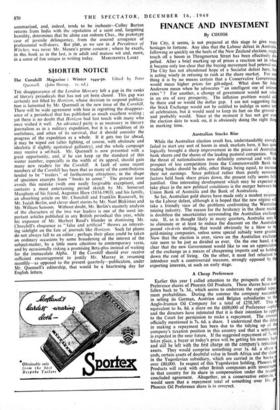SHORTER NOTICE The Cornhill Magazine : Winter 1949-so. Edited by
Peter Quennell. (John Murray. 2s. 6d.) THE disappearance of the London Mercury left a gap in the ranks of literary periodicals that has not yet been closed. This gap was certainly not filled by Horizon, whose decision to suspend publica- tion is lamented by Mr. Quennell in the new issue of the Cornhill. There will be wide agreement with him in regretting the disappear- ance of a periodical that has published so much excellent writing ; yet there is no doubt that Horizon had lost touch with many who once wished it well. An advance] party is as necessary in literary journalism as in a military expedition, but it is a condition of its usefulness, and often of its survival, that it should consider the progress of the expedition as a whole. If it gets too far ahead, it may be wiped out (after fighting, of course, with obstinate and idealistic if slightly egotistical gallantry), and the whole campaign may receive a set-back. Mr. Quennell is now presented with a great opportunity, and, if he can keep up the standard of this winter number, especially in the width of its appeal, should gain many new readers for the Cornhill. A fault of some recent numbers of the Cornhill has been that so many of the contributions tended to be " trailers " of forthcoming attractions, in the shape of specimen excerpts from " books to come." The present issue avoids this mistake (with one easily forgivable exception), and contains a most entertaining period sketch by Mr. Somerset Maugham of his friend, Augustus Hare (1834-1903), and his family, an absorbing article on Mr. Churchill and Franklin Roosevelt, by Mr. Isaiah Berlin, and clever short stories by Mr. Noel Blakiston and Mr. William Sansom. Without doubt, Mr. Berlin's masterly analysis of the characters of the two war leaders is one of the most im- portant articles published in any British periodical this year, while his exposure of Mr. Herbert Read's blunder in dismissing Mr. Churchill's eloquence as " false and artificial " throws an interest- ing sidelight on the fate of journals like Horizon. Such fat plums do not always fall to an editor ; perhaps their place could be taken on ordinary occasions by some broadening of the interest of the subject-matter, by a little more attention to contemporary verse, and by occasionally risking a promising Beta-plus instead of waiting for the immaculate Alpha. If the Cornhill should ever receive sufficient encouragement to justify Mr. Murray in resuming monthly—as opposed to the present quarterly—publication, under Mr. Quennell's editorship, that would be a heartening day for English letters.


































 Previous page
Previous page